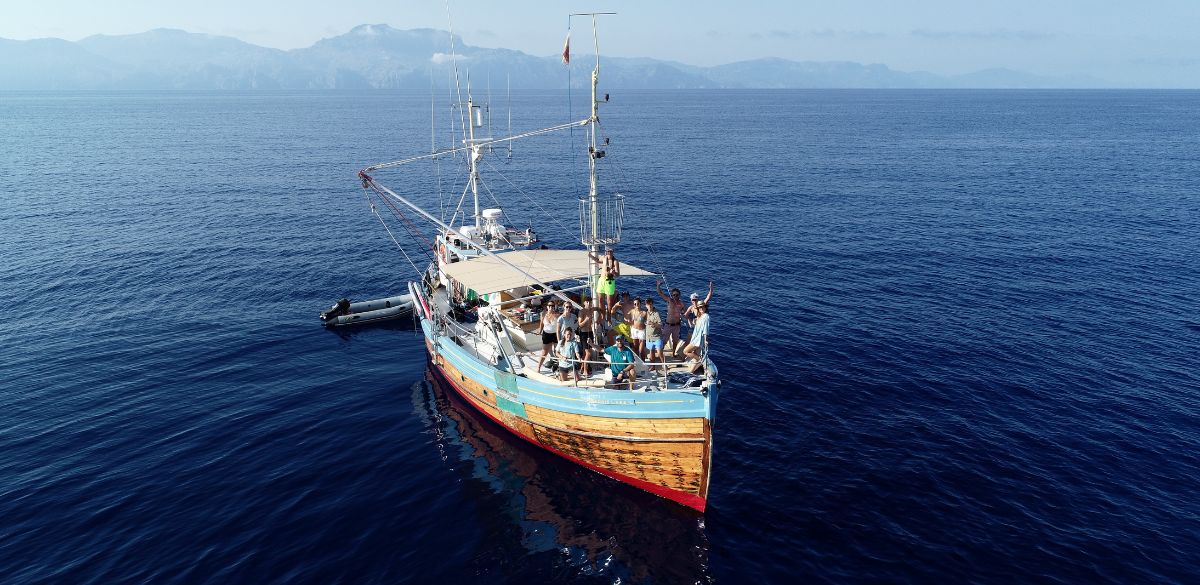Have you ever wondered how marine biologists study life in the open sea? Their work relies on advanced technology, innovative methods, and teamwork to understand and protect marine ecosystems. It also takes tremendous commitment and dedication to uncover the secrets of the deep blue and fight for its survival—advocating for the regeneration of ecosystems and biodiversity to restore the conditions necessary to sustain life in the sea. Plagued by overfishing, dense plastic pollution, and rising sea temperatures—just a few of the threats facing the Mediterranean—there is much work to be done, and urgently so.
Needless to say, these efforts face significant challenges. The tools and resources required for marine research are not only highly specialised but also expensive, and access to vessels is limited. This restricts researchers and conservation organisations alike in their ability to conduct fieldwork, collect data, and monitor marine ecosystems effectively.
The community vessel
In the Balearic Islands, local NGOs and researchers work tirelessly to address marine conservation issues, but financial and logistical constraints often hinder their efforts. Access to the sea isn’t just vital for scientists—it’s essential for educators too. Hands-on experiences like field trips and marine studies play a key role in raising awareness and inspiring the next generation of marine advocates and conservationists. Without access to boats, students miss out on immersive learning, reducing their connection to marine life.
To bridge this gap, Save the Med is launching the Community Vessel, a floating platform for scientific research and education. Supported by the Bonnie Lass, this expertly repurposed vintage fishing boat has been facilitating marine projects for over a decade. From microplastic analysis and biodiversity studies to sea turtle releases and citizen science campaigns, the vessel has fostered collaboration and engagement in marine regeneration efforts. The Bonnie Lass has been the go-to vessel for key Save the Med activities and collaborations, such as the Changemakers Project and shark conservation initiatives in partnership with NGOs like Palma Aquarium Foundation and Shark Med.
The Bonnie Lass boasts an ample deck space and large shaded table area which is ideal for both research and learning activities onboard. The vessel’s fuel-efficient engine, ample water storage, fully equipped galley with kitchen and shower room, and 12 berths below deck allow for extended autonomous operations, making it well-suited for longer sea expeditions. Its elevated bow and crow’s nest provide an ideal vantage point for observing marine life and monitoring marine reserves.
This year, the Bonnie Lass will once again transform into a floating classroom and lab, hosting impactful collaborative projects among local organisations, institutions, and experts that will include — but are not limited to — manta tagging, marine wildlife monitoring, and public outreach programs along Mallorca’s Tramuntana coastline.
“We’ve been supporting small conservation and educational projects through the Community Vessel every year,” says Peter Lucas, captain of the Bonnie Lass. “Whenever we could afford it or secure funding, we’ve worked on incredible initiatives in Pollença and Andratx. The involvement of the community and Save the Med’s team has been nothing short of inspiring.”
Beyond research, the Community Vessel fosters a deeper connection between people and the sea. By involving scientists, educators, and the public in regeneration efforts, the project instills a sense of ownership and responsibility for the Balearic marine ecosystem.
“Having a shared vessel brings everyone together—scientists, educators, and locals alike,” Lucas adds. “It inspires and equips them to protect the Balearic waters and coastline.”
Supporting the mission
The success of the Community Vessel depends on the support of individuals, organisations, and donors who share a vision for a healthier Mediterranean. Contributions, whether financial or in-kind as listed in our 2025 Wishlist, help ensure that the Bonnie Lass can continue to serve as a platform for education, science, and conservation.
“In-kind donations are incredibly valuable,” notes Brad Robertson, Save the Med’s President. “Even pre-loved items can make a huge difference in keeping the vessel operational and expanding our impact.”
A shared commitment for a thriving Mediterranean
From the depths of the Balearic Sea to the shores of Mallorca, projects like these are a testament to what can be achieved when people come together with a shared purpose. The Community Vessel exemplifies how collaboration, innovation, and grassroots involvement can overcome barriers to conservation efforts and foster community-driven marine stewardship.
As the Community Vessel takes to the sea again, it carries the hopes of all who care about our seas. By working together, we can ensure a healthy, vibrant Mediterranean for generations to come.





























0 Comments